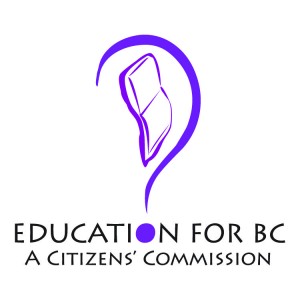Posts Tagged ‘Teaching’
An Announcement in Two Parts – Part 2: Let The Talks Begin
I want to talk to everyone.
I want to talk to parents, students, teachers, administrators, Trustees, business leaders, politicians, school district employees, community residents, the media, and more.
I want to talk to people in the Lower Mainland, throughout British Columbia, across Canada, and internationally. And I want to share the content of these discussions with others.
I want these conversations to be about education. Specifically, I want to discuss and investigate the following three key questions:
- What is education?
- What is the purpose of education?
- How do we deliver this education to all the children of BC to ensure the future health and vibrancy of our society?
I also want to make sure that education is a ballot box issue in 2017. I want the moderator of the next leaders’ debate to pose more than one throwaway question on the topic and I want every MLA candidate in this province to be asked about education when they are campaigning.
Why?

Because the current polarization in the education sector is not productive. The discussions about education in this province have devolved into ideologically formed positions and institutional battles with the result that we are not serving our children well.
The last Royal Commission on Education was held in 1988 and the world has changed since then, but these changes are not reflected enough within our education system.
During the recent job action, the BC Education Plan, a framework for planning proposed under the direction of the Ministry of Education, was politicized and the partisanship compromised the plan as an avenue for wide-ranging conversations.
I appreciate efforts such as BCEdChat on Twitter (Sunday evenings at 7:00 p.m. @bcedchat), the Ministry-led discussions around the curriculum, and many other individual initiatives meant to raise awareness of education issues. I also recognize the hard work of many other groups which have recently emerged to support public education. I hope they’ll all continue with the important work they’re doing. The more voices raised, the more they’re likely to be heard.
I also respect the work of the established groups which represent a collective voice for parents (BC Confederation of Parent Advisory Councils, BCCPAC), educators (BC Teachers’ Federation, BCTF), trustees (BC School Trustees Association, BCSTA), and others. Each organization has their own issues to address and I think they all have much to do in the future to meet the needs of their members.
Even so, it seems to me that we need to draw on a much wider circle of participation.
And that’s what I plan to do.
I want to create a forum and an arena where everyone can contribute to the discussion without having to be a member of any particular organization or having to espouse a particular outlook or perspective.
I want this to be a dialogue for all of us because the way in which we manage education affects each of us.
With this in mind, I’ve established a citizen’s commission on education. It’s a small step. One I felt I had to take because the “bigger picture” discussion about education has been lost in the turbulence of the sector over the past few decades.
This idea may work. It may not work. But I felt I had to do something to galvanize public attention and to give education in this province the attention and support it requires.
It’s time to focus the dialogue on education: what we mean by that term and what we want it to be. Then we need to let our political representatives know what it is we want from our education system. We can no longer sit back and have them tell us what education should look like because based on the evidence, their views do not seem to extend beyond the next election.
Join me in the conversation. Help me create a framework for dialogue. Visit www.EducationForBC.com and follow @edu4bc on Twitter. Help me get the talking started.
Let’s work together. Let’s make this happen for our children and for all of us.
Reflecting on the Post-Appeal Landscape
This is not an article about denying any person or organization the right to due legal process.
Why do I feel it necessary to start off with such a sentence?
Because I’m familiar with the way in which posted opinion pieces are picked apart in the frenzied hot-house atmosphere of social media and what I’m about to say will likely be open to simplistic misinterpretation.
Before I explain and as I’ve done in previous articles, I’d like to note that any errors of fact in the following discussion are my own as are the views expressed here: these are not the views of the West Vancouver Board of Education. I’d also like to clearly acknowledge that this is not a legal opinion.
Starting in 10 days’ time, the BC government and the BC Teachers’ Federation (BCTF) will once again be in court, this time at the BC Court of Appeal addressing the government’s appeal and stay which were both granted in response to the Griffin decision released earlier this year.
The case hinges on what Justice Griffin deemed to be the unconstitutional removal of clauses from the collective agreement relating to class size, class composition, and the ratio of specialist teachers.
I’m not going to dwell on the intricacies of labour law, on the history of the case, or on the relative merits of each sides’ arguments.
What I want to touch on is what may happen after the appeal.
Why?
Because it’s time to get public education in BC out of the courts and back into the classrooms and I’m concerned about the post-Appeal landscape in terms of the potential for continuing legal proceedings.
An article by Ian Mulgrew of The Vancouver Sun prompted me to reflect and write on this issue. In his piece, Mr. Mulgrew explains a recent Supreme Court decision which declared that the fees BC charges for court hearings are unconstitutional. The court ruled that these fees in effect prevented individuals from unfettered access to the legal system in their pursuit of justice.
So what’s the connection to the pending appeal of the Griffin decision?
To me, it’s this. We know the Supreme Court of Canada is the highest court in the land and we know it remains as the ultimate arbiter especially in regard to Charter issues. Applying to the Supreme Court of Canada with regard to a judgement ought not to be taken lightly and only with due regard to the consequences its decisions may have on governance and policy.
There has been much speculation that no matter who wins the appeal this October, the next step is bound to be the Supreme Court because the issues raised in the Griffin decision go to the very heart of collective bargaining rights.
But does it automatically follow that it is the right course of action in this situation?
Specifically, if the government loses the appeal would it be smarter to honour the spirit of the Griffin judgement and negotiate class size and composition rather than taking the matter to the Supreme Court of Canada and risking an outcome which could have a significant impact on all public sector agreements?
Similarly, if the government wins the appeal would it be smarter for the BCTF to honour the spirit of the Griffin judgment and negotiate class size and composition rather than taking the matter to the Supreme Court of Canada and risking an outcome which may actually relieve the government of an obligation to significantly reinvest in the BC public education system?
I know that lawyers for both sides will have very compelling reasons for their clients to continue to pursue the case all the way to Ottawa. Why not? It’s a legal challenge and becomes part of one’s legal legacy let alone precedence as law of the land.
However, is it valid to say just because you can doesn’t mean you have to? And while the outcome of the case on court hearing fees is a victory for citizens, I think the case regarding the BCTF collective agreement is even more complex and nuanced which makes the risk, in my opinion, greater.
And while I’m proud of our legal system and would always support due process, I’m not convinced — yet — that extending this particular legal imbroglio all the way to the highest court will be in the best interest of our students.
The Trouble With Our Schools Is Not ESL
In his English 104 lecture today at Simon Fraser University (SFU), Dr. Paul Matthew St. Pierre argued that our posts, tweets, texts, online articles, and other written forms of expression in the digital sphere are published works.
By publishing via these new media forms, we become authors and contributors to digital culture. I, for one, am grateful that technology has made this access to publication possible. In almost three years of writing for my blog, I’ve been able to put forward opinions on a range of topics for consideration.
However, by publishing on my blog, I’m certain readers know the content of each article represents my own personal opinion albeit informed by my experience, my work, my position, and my reflections on what I may have read, seen, and heard.
In contrast, opinion pieces published in traditional mainstream media publications, such as The Vancouver Sun, are imbued with the aura of a journalistic standard even when they too are statements of personal opinion. Even when marked with the label “Opinion”, as with today’s column by Shelley Fralic, this apparent legitimized authority can be problematic.
Why?
Simply put, because today’s contribution on the public education system by Ms. Fralic was poppycock.
The trouble with our schools is not spelled ESL as Ms. Fralic contends. Rather than spotting an elephant in the room, she has spotted a mouse and while focused on the “wee … tim’rous beastie,” running across the room to escape, she’s missed the herd of elephants standing right behind her.
It is true that the number of English Language Learners (ELL, previously ESL) is rising in our classrooms, particularly in the Metro Vancouver area. And it is true that more ELL students has contributed to greater complexities in terms of class composition. But does Ms. Fralic — or anyone else for that matter — really believe that removing ELL students from our classrooms would somehow magically eliminate the issues we face?
It’s preposterous because the problem with our schools — the real elephant in the room — is the slow steady erosion of government support which has seen, based on court estimates, approximately $300 million per year kept out of the public education system. That’s money which would have provided programs, resources, and services to all students including the help of specialist teachers.
And here’s the thing: the students who need the help of those specialists may be ELL students, and often they are not. Students arriving for kindergarten without adequate pre-literacy skills may be ELL students, and often they are not. The truth is obstacles to learning, whether speech impediments, learning disabilities, behavioural issues, or other, are not specific to any one culture or any one language.
Neither is poverty.
Neither is economic inequality.
And these are among the real obstacles to better functioning classrooms along with the lack of adequate community resources for all families, whether new to this country or not.
The reality is — as I witnessed in the school my child attended last year — a large number of ELL students introduces an amazing level of diversity into a school community. The learning opportunities, with the exposure to a variety of cultures, are magnified. And the emphasis on inclusion introduces a depth of acceptance that is unparalleled.
That’s how we build understanding. That’s how we build a society. That’s how we build tolerance.
ELL students are the ones who will emerge from our public education system fluent in more than one language: an invaluable asset in our globalized world.
And, their multi-lingual, multi-cultural sensibility is one they will put to good use in making their contributions to Canada and to Canadian culture.
From Job Action To Job Action To … ?
When I chose to run as a candidate in the 2011 municipal elections, the K-12 public education system in British Columbia was embroiled in job action.
Almost three years later, the public education system in British Columbia is once again contending with a job action which many are calling the worst ever for the sheer rancour of the debate, the barbed rhetoric which abounds, and the crumbling relationships.
In other words, my entire term as a Trustee on the West Vancouver Board of Education has been characterized by the lurch from one job action to another.
While bargaining has chewed away at my time as a Trustee, it’s insatiable appetite has also served as an obstacle to discussions and innovations on a number of educational topics.
Why?
Because if you’re consistently caught up in trying to clean up the mess your guests have made with the appetizers, you’ll never have the chance to sit down with your company to enjoy the main course.
If our focus is concentrated on bargaining issues, what are we not talking about? Here’s a short-list of “big picture” items which I feel are overshadowed by the labour situation whether at a local level or provincially (in alphabetical order):
Accountability
- which Ministry reports are essential and which ones aren’t?
- is there a way to simplify school district financial reporting to ensure better utilization of staff time and resources without sacrificing the integrity and thoroughness of the information required?
- aside from the issue of underfunding, is it time to review the current funding formula?
Assessment (I know much has been done in this area and some school districts have already begun experimenting with different approaches, but I’m afraid that work has been disrupted and the information won’t be available for sharing as best practices with others.)
- what should report cards look like at each level in the K-12 system?
- how do we continue to move forward on implementing models of formative assessment?
- is there a different way to organize credits at the high school level to enable a more flexible route to graduation rather than one based strictly on work in school or on a progression through grade levels?
Age Groupings
- is grouping students according to their age still the desired approach to education?
- how do we balance the advantages of early learning with the fact that for some students a later start into a formal school environment may be more desirable?
- do all students require a full five years of secondary education or should there be a fast-track option for some learners?
Calendar (some districts are already working with different calendars)
- do we have to start school in September and stop in June with the traditional breaks at the end of each calendar year, for spring break, and so on?
- are balanced calendar models more successful for students and their families?
- what are the logistical barriers to changing the calendar within a district? That is, does it work well to have one or more schools on a different calendar or does it work better to change all at once?
Community Links
- how do we break through the walls between our communities and our schools to improve and increase relevancy and connections?
- what sort of partnerships can we build with our community without compromising the integrity of our public education system?
- how do we draw on the expertise and skills of our community members to further enhance and support school learning and the work of our educators?
These are some topics I yearn to delve into along with other issues such as the new curriculum, pre-service requirements for future educators, and the structure of practicums for student teachers.
Oh, and what exactly is a teacher’s role and what do we even mean by education in today’s world?
And while I believe that a negotiated settlement is the best foundation from which we may be able to enter into a progressive and enlightening discussion on many of these issues, it makes me very sad to acknowledge that the time needed to repair relationships once a deal is signed means we may not have the time we need to talk about such things substantively let alone implement them before we’re at the bargaining table again!
In the meantime, school districts continue to strive to do the very best for the families of this province but if each electoral mandate continues to be a Ben Hur-like chariot race from one set of failed negotiations to another, we will — all of us — have failed in our duty to build a better world for our children.
It will be a collective failure of imagination.
Class Size and Composition: A Birthday Party Analogy
Issues of class size and composition tend to polarize the discourse about public education.
These issues are complicated because ideological positions inform much of the debate which is often emotional, replete with language around justice and economics, anxiety and flexibility, discrimination and fairness.
They also encapsulate a tug of war between the needs of students, the workload ramifications for teachers, the expectations of parents, and the managerial criteria of governments.
I want to explore these issues using the analogy of a birthday party.
Why?
Because we’re stuck in a gladiatorial arena where arguments on class size and composition are discussed in terms of competing narratives.
This restricts our ability to forge solutions and negotiate settlements rather than helping us forge fair and equitable resolutions. So why not try a different lens?
Let’s take a typical six-year-old in British Columbia who is turning seven. Which is easier to host: a birthday party for 12 or a birthday party for 20?
All factors being equal, one would be inclined to say a party of 12.
But wait. What if you have to tend to all the details for a party of 12 with no help? That could be much more work than booking a birthday package for 20 at a local community centre where all, or most, of the details are taken care of.
However, what if that group of 20 at the recreation centre includes a handful of children who do not take well to group activities? It may still be less work, but it may be as stressful as, or more stressful than, the small party for 12 at home. And that small party of 12 at home might be a lot less work if you have the help of family members and friends.
This may be a frivolous analogy, but it demonstrates a key idea: class size is important, but it’s not the only factor to consider with regard to structuring a successful learning environment. That’s why those who claim that class size doesn’t matter, in my opinion, are erroneously emphasizing short-term economic efficiency. Those who claim class size can be addressed as a formula are prioritizing workload considerations.
I think we need to figure out a new system for public education, one which supports smaller class sizes, allows the flexibility for larger class sizes where supportable, and in all cases supplies the resources and help required to ensure an optimum learning environment. In my imagined structure, a school district may very well have Grade 1 classes of differing sizes whether of 6, of 12, of 20, of 24, and even, depending on many other factors especially support services, 30.
Wait a second.
I overlooked the most important question.
Whose birthday party is it? What type of birthday party does the child want? Is he an introvert better-suited to small gatherings at home? Is she an extrovert better suited to a significant gathering with lots of activity and her as the centre of attention? Alternatively, would he or she really rather not bother with a party at all even at six years old?
Unfortunately, that’s the question which is often overlooked in the fractured and fraught discussion about class size and composition.
And yet, it is about the kids. Isn’t it?



